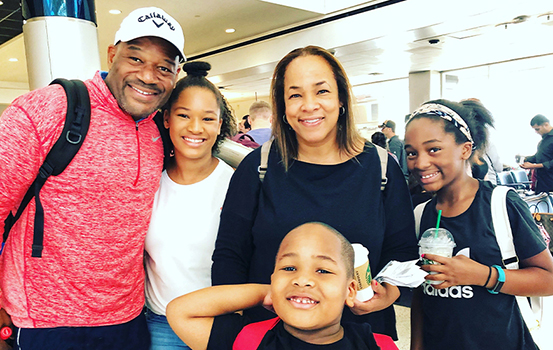Physicians choose to work locum tenens assignments for a variety of reasons — as a bridge from full-time work into retirement, as a way to earn extra money on the side, or because they enjoy travel, to name a few. Whatever your reason, with the right planning and preparation, a locum tenens assignment can be a positive and rewarding experience. Orthopedic surgeon and longtime locum tenens traveler Dr. Sonya Sloan shares her tips and advice on how to have a successful locum tenens assignment.
Planning for locum tenens

Before accepting a locum tenens assignment, here’s what you should think about to ensure your locum tenens experience will be a success.
Define what you are looking for
The first step is to define exactly why you’re interested in locum tenens. Are you looking for a short-term assignment to earn extra money or to pay off your student loans more quickly? Do you want to try out a new part of the country before moving there permanently? Are you just looking for a change of pace?
“I think it's about lifestyle and choosing what you want,” Dr. Sloan says. “If you’re a medical student or a resident trying to decide what you’re going to do, where you’re going to go, it’s a great opportunity to see the world and make some money.”
Once you are clear about the why, think through your expectations and what you want from an assignment. What schedule are you looking for? Are you okay with being on call? How many patients a day are you willing to see?
“My agenda is to make money,” shares Dr. Sloan. “So, if I’m able to get more hours, that's what I’m going to do. There are some locums doctors I work with who are on one week and off one week because they're there to see the world.”
Knowing what you want will help you choose the right assignment.
Find the right locum staffing partner
Once you’ve determined your motivation and expectations, it’s time to find the right partner to work with. If you want to have the best experience, find a locums team that suits your personality and has your best interests at heart.
“There are so many companies out there, and you want to know that they're going to take care of you,” says Dr. Sloan.
When choosing a locum tenens recruiter, make sure to look for someone who is honest, reliable, responsive, and knowledgeable about your specialty. You’ll want someone you can trust to find you a job that’s good for you, not good for the agency’s bottom line. You will also want someone who has a team ready to help you throughout every step of your locums journey.
“You want to be able to have an after-hours person, especially if you’re a woman traveling by yourself,” Dr. Sloan adds. “Not just the regular person who does your contracting, but a travel team too. CompHealth’s travel team has been central to making my life easier. And as I get into a groove, they know my routine. I’ve worked with other companies and it was hit or miss. That makes a difference of who you're going to come back to, because if I’m not comfortable, I’m not going to work with them.”
By partnering with the right locums agency, you’ll have a team to take care of all the details for you — helping with the paperwork, booking travel, getting your housing in order — and everything in between.
“When it comes to housing, I like having a kitchen if it’s longer than a 10-day stint,” Dr. Sloan says. “So, I recommend getting an extended stay that has a full kitchen and maybe a smaller living area, so you have a little space to live.”
Getting ready to leave on assignment
According to Dr. Sloan, there are two sides to getting ready for an assignment. The first happens at home.
“I’m a mom of three, married, and my husband has a mega-church here in Houston,” Dr. Sloan shares. “Before I leave on an assignment, I have groceries delivered or go pick up some stuff from Sam’s Club, and I have meals planned. We also have assistance here at the house for the kids — like someone to drive them to and from events, that kind of stuff. And then we have a housekeeper that can help out with keeping the house clean. So, I’m making sure everything is scheduled here and everyone has the same schedule, so it runs smoothly without mom.”

After getting her home life settled, Dr. Sloan gets ready to enter the new environment. She recommends having hard copies on hand with all the information for your assignment, including your contract and points of contact.
“I’m still that old-school person,” she says. “Digital is fine, but what happens if you don't have Wi-Fi or you can't get to it? I print everything.”
She also recommends downloading apps to your phone that will make traveling easier.
“I normally load up all my apps such as the app for the airline I’m flying, the car rental, and the hotel, so that I have all that information already loaded and ready to go,” she shares.
Other useful apps for locums physicians include Epocrates, Waze, and music apps like Spotify, Pandora, or Apple Music. (Make sure to download your favorite playlist or podcast to your phone, so you have something to listen to on the plane.)
What to do during the assignment
Here are a few tips and tricks Dr. Sloan’s picked up along the way to help your assignment run smoothy.
When you arrive
If there’s one thing Dr. Sloan has learned over the past 14 years of working locums, it’s to be prepared. She likes to get to an assignment a day or two early to get ready for her first day. She’ll map out and drive the route to the facility, even driving alternate routes in case there’s traffic. She also likes to drive around the hospital and, before COVID, would go inside and walk around to get the lay of the land.
She also recommends contacting your locums recruiter to make sure your paperwork is finalized, reaching out to the hospital contact to let them know you’ve arrived, and making sure you don’t need to bring anything your first day.
“I also give them the hotel number and the room number I’m in because there's been places that the cell service was horrible and they couldn't reach me on my cell phone,” she adds.
Onboarding
If a facility has worked with locum tenens physicians before, they’ll usually have an onboarding routine.
“First-time locums aren’t always anticipating all the things you're going to do their first day — from getting a badge, to having orientation, to doing paperwork and learning the computer system,” Dr. Sloan says.
At some locations, a hospital representative will help you get oriented on the first day. “And then the second time, you’re on your own,” adds Dr. Sloan.
You’ll also meet the team you’re going to work with. Pro tip: Dr. Sloan strongly recommends writing down their names.
“It’s respectful to write down names,” she says. “And then you’ll meet the OR nurse supervisor, and believe me, you better write her name down. It's the little things that people notice about you, the type of worker you're going to be. In return, they’ll be more willing to help you while you're there and make your life easier.”
When you’re not working
Whether you’re looking for a good place to eat or somewhere to explore during your time off, you should always ask someone local for a recommendation.
“They know all the back restaurants and little coffee dives and that kind of stuff,” she says. “I ask a lot of questions. I make notes on my phone, so if I’m coming back, I know to try this place or avoid that place.”
Although Dr. Sloan normally takes her lunch when she’s working at the hospital (“because you don’t know what the cafeteria will have or if it’s good”), she’s more adventurous when it comes to dinner.
“I usually try to find the local hangs, the local dives because that is part of the exploration, that is part of the fun,” she shares.
Getting ready to leave
According to Dr. Sloan, there are three parts to your offboarding.
“First is your timesheet,” she says. “Most places, a supervisor has to sign your timesheets, so you want to make sure that's done and taken care of. And second, run the list — who are the patients in-house, what room number they’re in, what's their diagnosis, what day they had surgery, what they may need in the next couple of days.”
Last, make sure to say goodbye to the staff and let them know when you’re leaving. If you can, let them know who’s coming in next.
RELATED: 5 mistakes first-time locums make and how to avoid them
After your assignment is over
Once you arrive back home, let your recruiter know you made it back safely. And don’t forget to send thank-you notes to the team you worked with at the facility (because you never know when you’ll be back for another assignment).
And then it’s time to get ready for the next assignment. Take note of what you liked and didn’t like about the last assignment and communicate it to your recruiter. Good feedback will help make your next assignment even better!
More from Dr. Sloan:
Want to learn more about locum tenens? Give us a call at 800.453.3030 or view today's locum tenens job opportunities.
 Blog
Blog